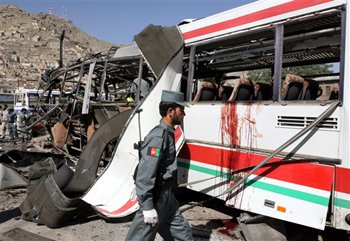KABUL: A suicide bomber wearing an Afghan military uniform detonated his explosive belt near a bus full of Afghan soldiers on their way to work here in the capital Saturday, killing at least 30 people, including two civilians, officials said. The bombing was among the deadliest in Afghanistan this year.

June 17, 2007: Bomb blast in Kabul which killed 35 police
Later in the day, President Hamid Karzai said he was willing to travel to the hideout of the Taliban's leader, Mullah Muhammad Omar, to conduct peace negotiations, and that he was prepared to allocate the leadership of some ministries to Taliban officials if they rejected further violence.
The comments appeared to reflect a more conciliatory and open posture toward peace negotiations with the Taliban, and they came a day after Karzai's return from a trip to the United States that included talks at the United Nations and the White House. Earlier this year he forswore direct negotiations with Omar and has apparently never publicly said he was prepared to name Taliban fighters as ministers.
The Taliban, who have had a resurgence across southern Afghanistan in the past two years, have accelerated their use of suicide bombings and kidnappings this year. Zabihullah Mujahid, a Taliban spokesman, said in a telephone interview that the group was responsible for the bombing Saturday.
The blast was so powerful that it peeled the sides off the bus, crushed the frame, catapulted a huge piece of the vehicle into a park across the street and shattered windows in shops and homes throughout the neighborhood.
Many people were wounded in the attack, including day laborers who had gathered nearby in the hope of finding work, according to a statement from the Interior Ministry.
"The Taliban has become an alternative source of employment, recruiting the jobless as foot soldiers in the insurgency," US-based Center for Strategic and International Studies said in a recent report.
Amid the Taliban's stepped-up campaign of violence, Karzai has been under increasing pressure from NATO countries to try to forge a political peace process that would resolve the insurgency.
He said Saturday that he was willing to meet face-to-face with Omar, the Taliban's leader, and with Gulbuddin Hekmatyar, an extremist insurgent leader, but that he would reject the Taliban's main condition for talks: a pullout of all foreign troops.
"If I find their address, there is no need for them to come," the president said. "I'll personally go there and contact them."
He also said he was willing to fold Taliban officials into key positions in his government, including ministerial positions in his cabinet, if they agreed to lay down their arms.
"If we are asked this, we will give that job to them instantly," he said. "I wish there would be a demand as easy as this."
The Afghan government has always offered a right to return home to Taliban who gave up violence and formally recognized the government. Several thousand low-level Taliban have gone through the reconciliation process and been allowed to return home with an amnesty.
Several former members of the Taliban government serve in Parliament, and a few more hold positions in provincial governments. Prominent members of Hekmatyar's party have been given government positions and have taken part in parliamentary elections.
Yet few high-level insurgent leaders have come forward to take advantage of the amnesty program, and several are still wanted by the United States for harboring Al Qaeda during the Taliban government here. Much of the high-level Taliban leadership has tried to hide out in Pakistan.
In September, Karzai renewed a call for talks with the Taliban. They initially said they might be open to negotiations but later said they would talk only on condition that all foreign troops leave Afghanistan.
Karzai rejected this demand Saturday.
"It should be very clear that until all our roads are paved, until we have good electricity and good water, and also until we have a better Afghan national army and national police, I don't want any foreigners to leave Afghanistan," Karzai said.
Carlotta Gall contributed reporting from Islamabad and Taimoor Shah from Kandahar, Afghanistan.



